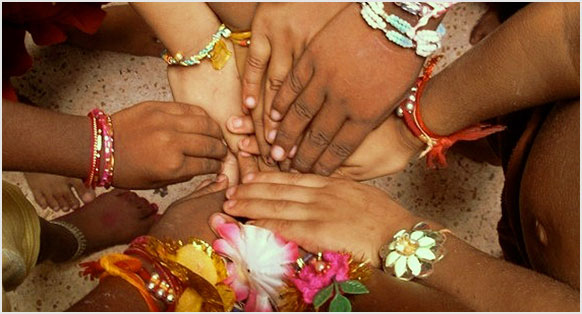
In every sense Raksha Bandhan is a true Indian festival. Rakhi is all about human emotions it's a celebration of love and care among siblings. It portrays the true picture of our rich cultural heritage and traditions. With the passage of time it is the celebration styles and perspective that has become contemporary but the customs, traditions and rituals is the same till date. Still today also the rituals are followed with the same respect and enthusiasm. Through out the country the festival is known as Rakhi or Raksha Bandhan but owing to its varied legends and significance RakshaBandhan is known by different names in different states of India, by different communities. The significance and the way it is celebrated also varies with the regions. It is primarily regarded as a North and West Indian Festival but is celebrated in other parts of India as well though the day of Shravan Purnima or Rakshabandhan has a different significance in southern and coastal regions. It is celebrated as Rakhi Purnima in the northern and northwestern parts of India. Here it is celebrated as the bond of love between a brother and a sister.
In areas of Madhya Pradesh, Bihar, Chattisgarh and Jharkhand Raksha Bandhan is called by the name of Kajari Purnima or Shravani. Here Raksha Bandhan is an important day for farmers and women who have sons. In the southern parts of India in places like Kerala, Andhra Peadesh, Tamil Nadu and parts of Orissa Rakhi Purnima is called Avani Avittam. It marks an important day for the Brahmins. The day is called Upakarmam by the Brahmins. They change their holy threads on this day. In the Western Ghats side that includes the states of Gujarat, Maharashtra, Goa and Karnataka here Rakshabandhan signifies the beginning of a new season for those dependent on sea. It is called Nariyal Purnima or coconut full moon in these areas. In Gujarat Raksha Bandhan day is celebrated as Pavitropana the day, which marks the worship of Lord Shiva. Due to India's multifaceted cultural background each regions has a different name and celebration for the Rakhi Purnima but what ever may be the custom or tradition the common link is the tying of Rakhi on Raksha Bandhan, which is now a part of all the ceremonies. India unity in diversity is portrayed even in celebrating Raksha Bandhan. Rakhi, which is mostly celebrated in the northern part of the country. But in other parts of India the festival is celebrated in various other ways. The rituals and customs, which are followed, differ from region to region but all the celebration across the country maintains the actual essence of the celebration, which speaks of spreading love and concern for each other.
The Rakhi festival or Raksha Bandhan has a special significance in hearts of brothers and sisters. The silken thread of Rakhi symbolizes the love between siblings. The Rakhi Festival symbolizes all aspects of protection of the good from evil forces. Rakhi is meant to sweeten the ties of brother and sister. Rakhi is celebrated with great joy and excitement all around India. Known as Raksha Bandhan in other parts of the country, Rakhi festival showcases the love, affection and feeling of brotherhood. Raksha Bandhan usually falls in late August. The main ritual consists of tying the 'Rakhi' knot on to a brother's wrist. 'Raksha Bandhan' literally means 'Bond of protection' and implies that while the sister prays to God for the well-being and prosperity of her brother, the brother vows to protect her against all the evils of the world and help her in all the problems. The day is all about Raksha or protection. The values, emotions and the sentiments attached to the customs of Rakhi festival are worth inculcating by the whole human race, the sentiments of harmony and peaceful coexistence.
Rakhi is celebrated with great excitement and joy across India and other parts of the worlds where Indians reside. From early morning everybody starts getting ready for the occasion. On the day of Rakshabandhan, people generally prefer to wear traditional attires. Men mostly wear kurta pyjama on this occasion whereas women prefer to wear sari or salwar suits, which are mainly Indian traditional clothes. People generally prefer to wear cotton material cloths, as this is comfortable during this season. But with the changing fashion trends every year, people generally tend to follow the fashion of that season during the festival time. But for Indians, the traditional and cultural chord is so strong that no matter where the siblings are, they will try to wear traditional Indian clothes that reflect our values, tradition and culture. On the occasion of Rakhi, special dishes are prepared, which includes sweets and namkeens. The day has a deeper perspective in today's scenario. The rakhi tying ritual has become so much a part of the families that come what may brothers and sisters try to reach out to each other on this particular day bringing back the oneness of the family, binding the family together in an emotional bond.
 Easy recipes
Easy recipes
 Healthy Recipes
Healthy Recipes
 Dessert Recipes
Dessert Recipes
 Mutton and Lamb
Mutton and Lamb  Indian Bread Recipes
Indian Bread Recipes
 Dal Recipes
Dal Recipes
 Chutney and Pickles
Chutney and Pickles  Indo-Chinese Recipes
Indo-Chinese Recipes
 Snacks and Appetizers
Snacks and Appetizers
 Low Fat Recipes
Low Fat Recipes
 Chaat Recipes
Chaat Recipes
 Biryani and Rice
Biryani and Rice  Curry Recipes
Curry Recipes
 Indian Sweet Recipes
Indian Sweet Recipes
 Egg Recipes
Egg Recipes
 Paneer Recipes
Paneer Recipes
 Chicken Recipes
Chicken Recipes
 Indian tiffins
Indian tiffins
 Egg less Recipes
Egg less Recipes
 Soups and Salads
Soups and Salads
 Indian Sea Food
Indian Sea Food
 Manchurian Recipes
Manchurian Recipes
 Indian Drinks Recipes
Indian Drinks Recipes
 Dinner Recipes
Dinner Recipes